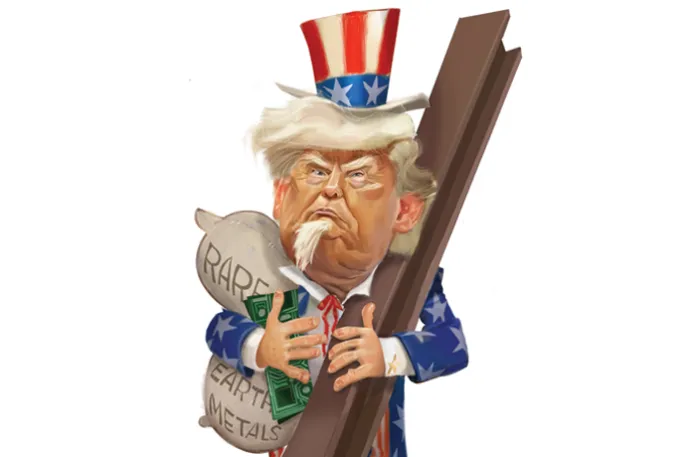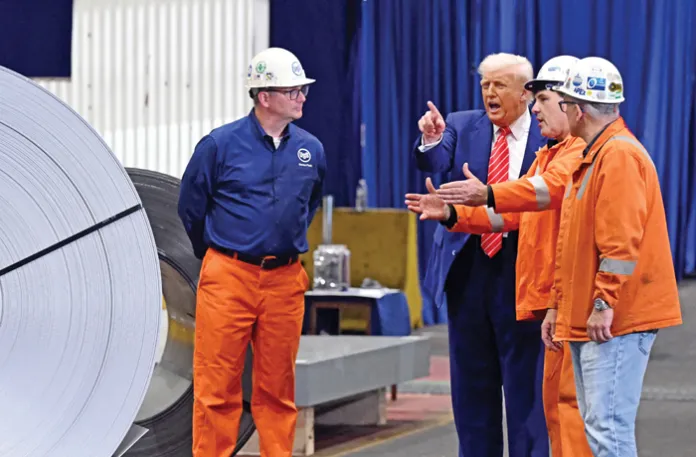President Donald Trump has made government investment and industrial policy a centerpiece of his second, nonconsecutive term. Some commentators liken his approach to “state capitalism,” an American version of the model used by China and the Soviet Union. The administration claims it will usher in a “golden age of America” through increased foreign investment and prosperity. Stagnant growth and investment, however, have classical liberal economists warning that only free markets, not government heavy-handedness, drive lasting economic success.
What counts as state capitalism depends on who you ask. Todd Tucker of the progressive Roosevelt Institute said it must be interventionist to define a “democratic, public-minded industrial policy,” while Phil Magness of the Independent Institute compared it to 16th- and 17th-century European mercantilism, in which governments steered the economy to favor politically connected industries. Veronique de Rugy at Mercatus Center suggested the Trump administration was involved in more “transactional capitalism,” in which the White House agrees to a deal with another country because Trump perceives some kind of advantage.
The Trump administration’s first major move into direct investment in the economy came early in the summer with the approval of Nippon Steel’s $17 billion purchase of U.S. Steel. The president said he approved the purchase to help steelworkers keep their jobs.

The deal also gave the government unusual control over U.S. Steel, a move intended to protect jobs and production. Trump used the power months later to prevent the steel company from reducing operations at an Illinois plant. Unions called the move a small win, but the facility could still be sold in the future.
Weeks later, the Trump administration took bolder action — securing stakes in rare earth mining and chipmaking companies. The direct taxpayer investment in private companies reshapes their operations.
On July 10, the War Department announced it was the largest shareholder in MP Materials, a little-known rare earths mining company. The $400 million deal includes long-term purchasing commitments for rare earth magnets, possibly giving the Pentagon control over production and pricing at a facility that has yet to be built. Company executives promised the government wasn’t nationalizing the firm but entering into a public-private partnership to “accelerate free markets.”
Then there’s Intel, the Trump administration’s biggest move into direct ownership of a corporation.
It cost taxpayers $8.9 billion for the United States to buy a 10% stake in the chipmaker, with the option for another 5%. This was despite Trump’s claim that the U.S. spent nothing but reaped the benefits of Intel’s rising stock.
It remains to be seen how Trump plans to make Intel successful. Unlike the Nippon-U.S. Steel deal, the U.S. did not publicly state it has a say in Intel dealings. UBS analysts suggested the government might encourage companies like Apple and Nvidia to buy more Intel chips to prop up Intel shares, a prediction that appeared to come true in September, when Nvidia announced a massive data center and PC product partnership with Intel.
Experts warned the approach could backfire. Adam Thierer with R Street Institute and Michael Brown at Pepperstone predicted the deals would hinder ingenuity and inventiveness in exchange for making the companies beholden to the whims of the Oval Office. Ryan Young of the Competitive Enterprise Institute said the deals were socialism “in exactly the sense socialists themselves favor: state ownership of the means of production.”

By contrast, the Obama administration sold its stake in General Motors in 2013, four years after bailing out the automaker. The real losers were the American taxpayers. Despite promises that the deal prevented an economic catastrophe, only $39 billion of the $49.5 billion loan was recovered by the government.
History offers more cautionary tales of what happens when countries flirt with strong government control of the economy.
In the 1970s, Swedish Social Democrats tried to fuse socialism with market economy in what economist Gunnar Adler-Karlsson called functional socialism. Private property remained, but regulators dictated how it was used.
The Swedish economy nearly flatlined, with slow or negative growth, shrinking trade, and stagnant employment. Meanwhile, inflation shot up. The Swedish government eventually changed course in the 1990s after enacting government cuts.
Argentina provides an even starker lesson. Its economy remains in a state of flux due to Peronism, an ideology created by Juan Peron and described by Magness as an odd mixture of socialism and nationalism. It relies on five-year plans and the nationalization of railways, shipping, and food companies.
Instead of prosperity, Argentina suffered from extreme periods of rising prices, high unemployment, and repeated financial crises. Just this April, Argentina accepted $32 billion in combined bailouts from the World Bank and the International Monetary Fund. U.S. Treasury Secretary Scott Bessent promised an additional $20 billion in aid, plus additional purchases of government debt. This was after the Peronists won some local elections.
Bessent added multiple U.S. companies would consider making “substantial foreign direct investment” in Argentina “in the event of a positive election outcome.”
But with U.S. government debt now exceeding $37 trillion, critics warn America risks the same spiral.
“You quickly find you have to interfere even more to fix the distortions you just created,” Johan Norberg, an economist with the Cato Institute, told the Washington Examiner. “Where does it stop? When the money runs out, and private initiative has been smothered completely.”
What could distinguish Trump’s style of state capitalism from previous styles are his handshake trade deals. His administration has claimed the agreements with Japan, South Korea, and the European Union include promises of combined investments of over $1 trillion. U.S. Commerce Secretary Howard Lutnick said the money would come directly from foreign governments, with the White House deciding where it would be spent. Magness called the agreements “constitutionally dubious” while suggesting they are probably unenforceable and lack legal standing.
The administration has promised its strategy would encourage more foreign companies to expand into the U.S. That growth hasn’t materialized. Statistics from fDi Intelligence show investment remained flat this year compared to 2024. Meanwhile, more American companies are looking to expand overseas.
The good news is that foreign companies have promised $241 billion combined worth of expansions in America.
But economists note those are promises that amount to nothing if the money and jobs never show up. They cite the uncertainty surrounding trade and tariffs, which have wildly swung throughout the year. Norberg suggested it could be cheaper for foreign manufacturers to build a product outside the U.S. and then pay a single tariff on a finished product to avoid paying multiple tariffs on components.
That strategy risks alienating America’s traditional allies. Young predicted more companies might be willing to do business in China or somewhere else instead of dealing with the headache of U.S. government policy. Magness exhorted strong free trade agreements as an economic buffer against China’s diplomatic and military aggression, instead of jawboning unenforceable handshake agreements that a court could later throw out.
This could be why American corporations aren’t publicly complaining about the headwinds. The administration is known for its vengeful attitude toward certain opponents in hopes of silencing dissent. That complicates matters, particularly for businesses looking to make a profit.
It also sets precedent for future administrations in which the ceiling of presidential power becomes the floor for the next one.
“Once you expand government power to impose your own preferences on the economy, someone else will eventually use that same power to impose theirs — which might be the opposite of yours,” Norberg warned. “Before Trump or the Democrats give the government more control, they should ask what happens when their worst enemies are the ones in charge.”
Young accused the administration and its allies of focusing on short-term wins in exchange for long-term losses. “If courts OK the administration’s emergency and national security rationalizations for its policies, then it’ll be easy for the next Democratic administration to declare, say, a climate emergency or a social justice emergency, then do anything it wants,” he said.
STAGFLATION POSES ECONOMIC AND POLITICAL THREAT TO TRUMP ADMINISTRATION
Regardless of whether it’s “state capitalism” or “transactional capitalism,” Trump’s policy rapidly expands the federal government’s role in the economy. The U.S. faces a choice: whether to renew its commitment to free market principles or move into a managed economic model like China or the former USSR.
Norberg hopes the administration chooses the former instead of the latter. He said it relies on millions of entrepreneurs, workers, and households coming up with new ideas and innovations by doing things faster, better, and cheaper than the past to help grow the economy.
Taylor Millard is a freelance journalist who lives in Virginia.
